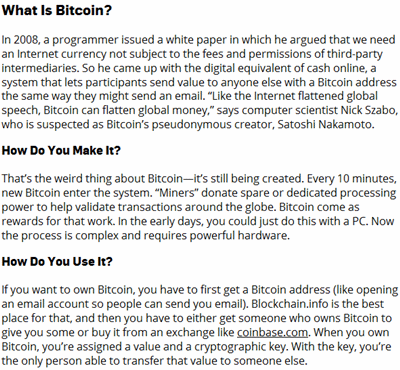In April, an experimental crowdfunding project started accepting online investments. This system, called the DAO (for Decentralized Autonomous Organization), was like a cross between Kickstarter and a venture capital fund, but with a twist: interested parties had to convert their money into a new type of digital currency before they could invest. Participants could then vote "yes" or "no" on submitted proposals, deciding as a group what to invest in. When a project got enough "yes" votes, computer code would automatically disperse the funds.
The story had already popped up a few times in this blog, for example Bitcoin in the News : 2016-07, but I had never taken the time to understand it properly. The article continued,
By the end of May, the DAO had amassed the equivalent of $150 million. But a few weeks later, an anonymous hacker identified a flaw in the voting system and siphoned off more than a third of the funds. "You can think of this as a bank robbery of sorts," says Emin Gün Sirer, an associate professor of computer science at Cornell, "except one much bigger than any before it."
That Cornell connection goes deeper than that.
Sirer's work on the DAO -- studying a new type of financial technology and advising the industry on how it can be implemented and improved -- epitomizes the work that he and his colleagues do at the Initiative for Cryptocurrencies and Contracts (IC3). Founded in January, it's led by Sirer and two other co-directors -- Elaine Shi, an associate professor of computer science on the Hill, and Ari Juels, a professor at Cornell Tech -- and includes collaborators at the University of California, Berkeley, and two other institutions. They comprise what Sirer calls a "dream team" of about fifty people who are looking for ways to make next-generation financial technology systems more secure, scalable, confidential, and safe, while also developing new technology-based financial products with industry partners.
For more about IC3, see Initc3.org, 'IC3: Advancing the science and applications of blockchains'. This is the second time I've used CAM as a source on a blog post. The first was 'Not a Sane Bone in His Body' (November 2012), about Bobby Fischer.
